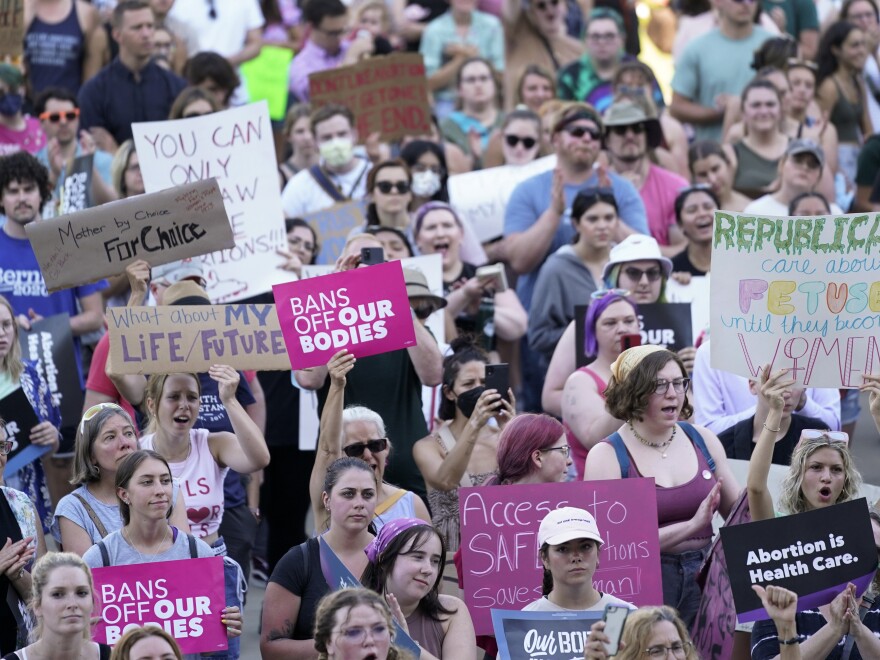One year ago this week, the Supreme Court issued its Dobbs decision, which meant that millions of Americans no longer had guaranteed access to abortion care. It was a political earthquake, and in many ways the ground is still shaking.
For decades, the politics around abortion had been pretty well set, with the Roe v Wade decision making abortion legal nationwide. Republicans wanted Roe overturned, and that motivated their voters. Democrats, on the other hand, simply weren't as energized by the issue, and Democratic politicians often shied away from talking about abortion.
But after Roe was overturned, the politics flipped.
"The threat of women losing a right we've come to expect and rely on, after 50 years of having it mobilized people, it enraged people," said Michigan Governor Gretchen Whitmer in an interview with NPR. "It coalesced people."

How Dobbs motivated voters in Michigan in 2022
Abortion was on the ballot in Michigan in 2022 — quite literally — as residents voted on a referendum establishing a state constitutional right to abortion and contraception.
On election night 2022, the polls closed at 8 p.m. in Michigan, but anyone already in line, could stay and vote.
"The last voter to vote at the University of Michigan was a little after 2 in the morning," said Sen. Gary Peters, D-Mich. "They stood in line for hours. They were not going to let Republicans take away a fundamental right that their mothers had."
Peters led nationwide efforts to get Democrats elected and re-elected to the U.S. Senate in 2022 and he's been tapped to do the same in 2024. He says the Dobbs effect was clear and he doesn't see it fading.
Democrats did better than expected in the midterm elections. In a break from the past, they talked extensively about abortion rights, saying it was a matter of freedom and painting Republicans as extreme. Their voters showed up and independents broke towards the Democratic candidates in key races.
Whitmer, who was running for re-election in 2022, won her race by 10 points, a substantial margin over a GOP opponent who said the only exception to a ban on abortion should be the life of the mother. The state referendum on reproductive rights was approved with an even larger margin.
Describing her state as a very purple swing state, Whitmer said the Dobbs decision "has been something that has really changed the whole landscape here, flipping both chambers of our legislature for the first time in 40 years and returning me to office and, and a host of other people who are fighting for these rights."

How Dobbs changes things for Republicans
When Roe was in place, the politics were simpler for Republicans. They could just say they wanted it gone and press Democrats on whether they would support any limits.
Now Republican candidates are being pressed on what they want. A total ban? A six-week ban, as Florida Gov. Ron DeSantis recently signed? Should medication abortion be outlawed? What about exceptions?
In an interview with Fox News Sunday earlier this year, Republican party chairwoman Ronna McDaniel said abortion was a key issue in states like Michigan and Pennsylvania in 2022. These are states that will be important in the 2024 presidential race as well.
"The guidance we're going to give to our candidates is, you have to address this head on," said McDaniel. "The Democrats spent $360 million on this. And many of our candidates across the board refused to talk about it thinking, 'Oh, we can just talk about the economy and ignore this big issue,' and they can't."
Polls show Dobbs decision was unpopular
The challenge is, the American public isn't in the same place on abortion access as Republican primary voters. Nationwide, the Dobbs decision remains unpopular. An NPR/PBS NewsHour/Marist poll out this week found 57% of those surveyed were opposed — led by Democrats, independents and women.
Democratic pollster Celinda Lake says public support for abortion increased right after Dobbs and has been enduring.
By way of example, she points to the mayoral race last month in Lincoln, Neb. The Democratic incumbent in the race, who Lake consulted for, made abortion a central issue in her campaign, saying her Republican opponent was extreme because of statements she had previously made about abortion.
"This issue became a core values issue," said Lake, who also does polling for President Biden and the Democratic National Committee. "It's like, 'I'm not going to vote for someone who has these views. I don't care what office you're talking about. If you're talking about president to dog catcher, I'm not going to vote for someone with these values.'"
Will the issue remain a big driver?
Republican pollster Patrick Ruffini said he's not convinced that come November 2024, abortion will be biggest driver of voter enthusiasm. He says he's seen a reduction in voter intensity on the issue already. Abortion rights are settling in, with Democratic-controlled states moving toward near universal access to abortion, and Republican-controlled states putting in restrictive bans.
"As we settle back into, what feels like a status quo ... it's going to be, I think, tougher to move people and to message on the issue," said Ruffini.
Democrats are betting they can keep this issue front of mind. There are looming court decisions that could limit access to medication abortions and there's still some action in state legislatures. Sen. Lindsey Graham, R-S.C., is again talking about introducing a nationwide abortion ban in Congress, pegged to 15 weeks of pregnancy. While that legislation has no path to pass in the current Senate, the issue is certainly going to be a matter of debate in the competitive Republican presidential primary.
Copyright 2023 NPR. To see more, visit https://www.npr.org. 9(MDA2NzIzNDU3MDEyOTQwNzY4ODRmZGYzYw004))







